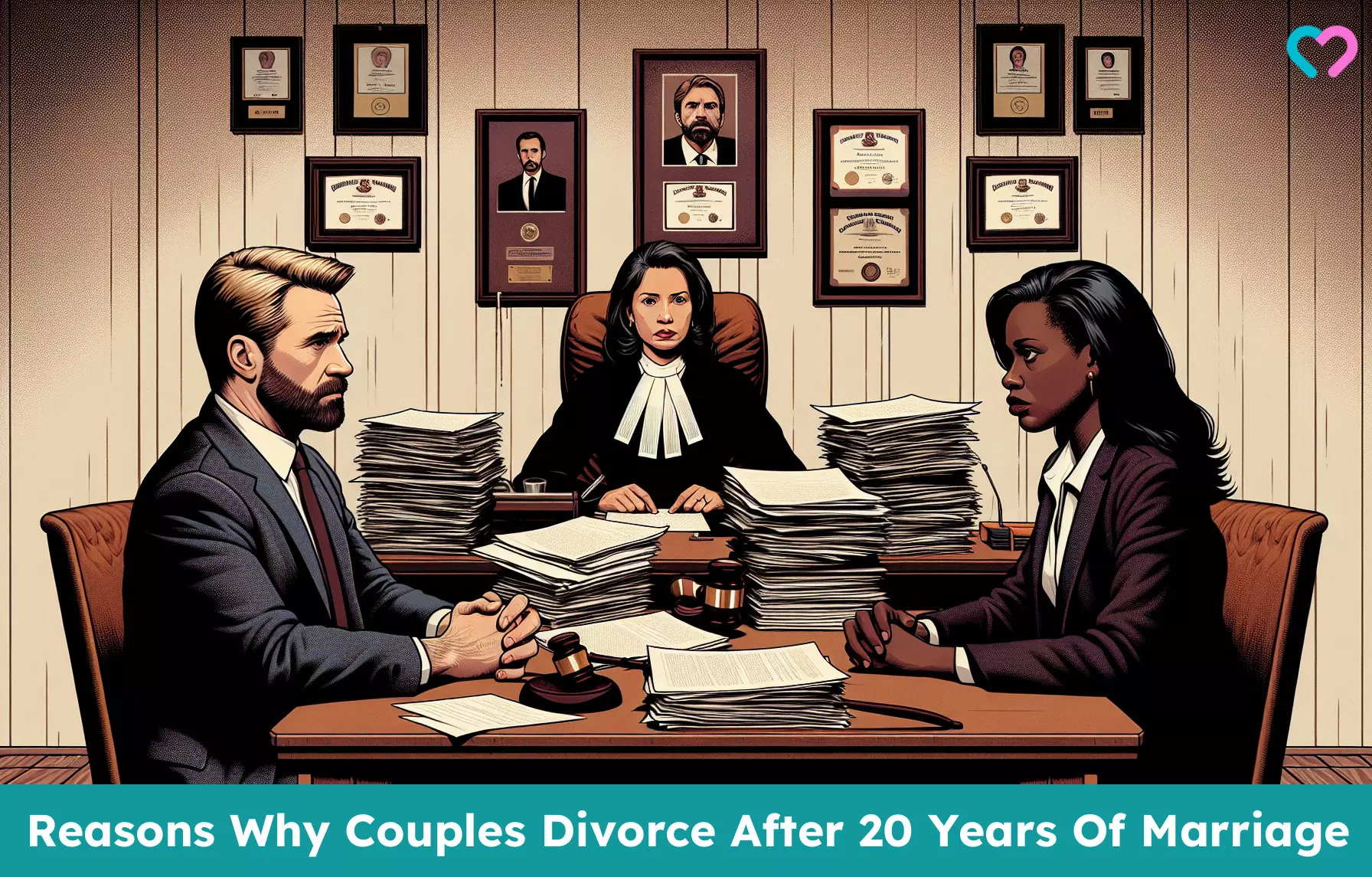
Image: Shutterstock
Divorce after 20 years of marriage is often not understood by everyone. Middle-age divorces are also known as silver or diamond splitters or gray divorces. Those not part of the relationship may think there’s no point in opting for dissolution as a major part of their life has gone by. But whoever is going through a rough patch knows it better. This post discusses the multiple reasons why middle-aged couples get divorced. It also addresses the changes in social norms as more and more older adults are ending long-term marriages, disregarding the stigma associated with them. And if you are splitting up or parting ways, we have some effective strategies to help you move on and cope with life without your ex-partner.
Key Pointers
- Divorces among middle-aged people have been on the rise in countries like US.
- Many reasons cause couples to part ways even after many years of marriage, like lack of communication, unresolved issues of the past, and lack of mutual growth.
- Having financial clarity, finding a support system and shunning negativity help you weather this storm.
How Common Is It For Older Couples To Divorce?

Research shows that the overall trend of divorce in the US is decreasing for the past 20 years, but the divorce rate is higher among people aged 50 years and above (1).
According to the Pew Research Center, divorce statistics among 50+ couples in the US has doubled since 1990 (2). Divorce rates peaked between 1960 and 1980, then leveled off for younger couples but continued to rise for older adults. Divorce rates for those over 50 doubled between 1990 and 2010 (3).
The graph illustrates the changes in the divorce rate over the last two decades in couples between the ages 25-39, 40-49, and 50+. While the rate of divorce decreased in the 25-39 age group, it is on an increasing trend in the other two groups.

Divorce rates among 50+ population in the US
Source: Pew Research CenterWhy Do Couples Separate After 20 Years?
Each couple has reasons to break up after many years of marriage. At times, they might have a strong sense of realization that the best part of being with each other is over, and the right decision is to move towards termination of the marriage.
The following are some common reasons why couples get separated after 20 years of being in the wedlock.
1. Falling out of love
Some couples have had a good life together nurturing the family and parenting the kids, but there is no love left between them. Disengagement might have let them grow apart over the years. Life’s responsibilities, challenges, and failures might suck the love out of the relationship. Many couples try to avoid the elephant in the room for several years or decades together but realize and accept it someday and might get separated in search of happiness.
2. Lack of mutual growth
Personal growth, for many people, is a lifelong process, and it does not stop until death. However, when only one of them has such aspirations, it becomes difficult to live with each other. It is difficult for the growing partner to see the stagnation of the other half, while the other half may feel that their partner has too many aspirations and no satisfaction. This often results in a disconnection because of different lifestyles, financial goals, and retirement plans, which might cause a disseverance between them.
3. Unresolved issues of the past
There might be some unresolved issues of the past that resurface after several years. Couples might hide their issues in the closet for the sake of their social image or kids, but there comes a time when they can no longer fake it or live with it. Things such as a big lie, cheating, an accident, a bad fight, a debilitating illness, etc., might keep resurfacing leading to a disunion.
4. Old-fashioned thought process
One of them could be orthodox, while the other is unconventional. In such cases, one of the partners is often too rigid to change with changing times, while the other likes to be dynamic and updates with the latest trends. This difference might lead to a disruption in their ability to be in sync with each other.
5. Lack of communication

Lack of communication is one of the biggest reasons for divorce. Over the years, couples tend to forget that communication is the key to a successful marriage. They fail to communicate their affection, leading to disaffection. This distance between them grows to a point where they cannot be happy with each other and may end up in divorce. In the report published by the Journal of Family Psychology, it has been found that premarital negative communication significantly predicts divorce and marital distress, while positive communication has less impact. Couples who manage negative emotions better are less likely to experience distress within the first five years of marriage. This highlights that poor communication early on can contribute to long-term issues, potentially leading to divorce even after 20 years of marriage as unresolved patterns resurface (4).
6. Losing connection over the years
Raising kids, excelling at profession, and handling all big and small problems of life is taxing. Raising kids is said to be the most satisfying yet the most draining part of life for an average couple. Giving birth to children, nurturing them, providing education, and striving to give them a better life take priority over the bonding with the spouse. Couples may not find enough space or time for romance, leading to the disintegration of their connection with each other.
7. Kids leaving home
A house once lively with children, their laughs and fights, suddenly becomes empty and dull when they grow up and leave home. It is a difficult transition for parents from a lively home to an empty nest. They are left with only each other, and the entire family arrangement needs to be redone. This partition procedure might make one realize their incompatibility with each other. Moreover, children are the glue that holds the parents together. Once they move out, the couple might drift apart. This is a huge factor that contributes to mid or old-age divorces.
 Point to consider
Point to consider8. Never in love
Some couples have lived their lives together but might have never actually been in love with one another. They might portray to be a happy couple for the sake of social image or their children for years together. It is also possible that they got married under family pressure and never had the necessary compatibility. Love is the fuel that keeps the ship sailing, but in the absence of love, it gets difficult to live together after a certain point. In such situations, divorce risks are high.
9. Personality disorders and mental illnesses
Personality disorders like the inability to perceive the truth, impulsive behavior, obsessive behavior, severe mood swings, etc., take a severe toll on the relationship. Despite seeking professional help, such problems might persist. Also, mental health problems such as schizophreniaiA psychological disorder causing delusions, hallucinations, and impaired thinking and emotional processing , PTSDiThe disorder characterized by symptoms such as anxiety, insomnia, or nightmares triggered by a past traumatic incident , dementiaiA broad term for memory loss, language or problem-solving issues, and other mental abilities that interfere with daily life , Alzheimer’siA disorder that impairs memory, reasoning, and, eventually, the capacity to do the most basic tasks are lifelong responsibilities and might exhaust the caregiving partner. If a person has severe physical health issues and is too dependent on the spouse for a long time, then it might exhaust the spouse, who may consider separation.
10. Mistrust and lies
It becomes impossible to live with a compulsively lying partner, whom you cannot trust. Lack of trust over the years might force the other partner to put their foot down and call it quits, having realized the disjunction in values and that the spouse is incorrigible.
 Do remember
Do remember11. Professional failure
The stress to succeed professionally can sap the love out of your marriage in the prime years of the married life. However, professional failure or financial crisis, despite all the efforts, can bring a real change to marriage. Stress from such failures may lead to divorce.
12. Abusive relationships

Abuse can be physical, mental, financial, sexual, or emotional. In many cases, such abuse is usually not tolerated for 20 years. But some people might tolerate it due to fear, financial dependency, social obligations, lack of support, or lack of courage to walk away. When the abused person reaches that stage of life where they can no longer take it, then it leads to divorce.
13. Addictions
Hidden or open addictions of gambling, sex, smoking, drugs, alcohol, shopping, stealing, hoarding, etc. might be strenuous for the spouse to handle. The person might have tried hard to help their partner come out his/her addictions by seeking medical help, counseling, vigil watch, setting boundaries, etc. But it isn’t a one-way street, and if the other person is not willing to reform, then it might lead to separation.
14. Extramarital affairs
Infidelity is a leading cause of failed marriages. Extramarital affairs can be of various forms, like indulging in one-night stands, visiting strip clubs, social media flirting, social media dating, etc. These can be detrimental to a marriage. It may not be easy for everybody to forgive their cheating spouse. According to researchers from the Department of Psychology of the University of Denver and the University of Colorado, 52 divorced individuals were interviewed, and findings suggest that divorces often happen due to lack of commitment, infidelity, or constant arguments (5). These issues can build up over time, making them common reasons for divorces after 20 years of marriage.
An anonymous blogger shares her experiences after discovering her partner’s extramarital affair ten years after being married. She says, ”The problem with affairs is that you wake up to find your spouse/partner has been cheating on you. I realize that our “first” marriage ended during his affair – not upon my discovery of the affair. For my husband, our marriage changed (died/ended?) upon his decision to be involved, emotionally and physically, with his affair partner. Which means my marriage died without me even being told or invited to the funeral. I was living in a marriage for just over a year that wasn’t really there anymore (i).”
15. Therapy and counseling fail

When couples find the bond between them diminishing and themselves drifting apart, they might seek therapy down the lane of long wedlock. During the therapy, they may realize that their incompatibility has no scope of improvement. In such cases, the couple can mutually decide to go for a divorce and free themselves from an unhappy marriage.
16. Different sexual preferences
One of the partners might come out of the closet after a few years of marriage. They might be hiding their sexual preferences or sexual orientation for several years before they finally muster the courage to tell it to their partner and the world. Such scenarios may end in divorce.
17. Procrastinating the separation
They might have realized their marriage is not working out for whatever reason, but they could not take the step due to work/kids/society/afraid of being alone.
18. Unrealistic expectations
Unrealistic expectations in marriage can cause disappointment and resentment and lead to divorce. People may have a picture of what their marriage should look like, and if these expectations aren’t met, they can create a deep sense of dissatisfaction and disillusionment. This long-term frustration may erode the foundation of trust and understanding, leading to a breakdown in communication and emotional connection, ultimately resulting in the dissolution of the marriage.
19. Financial problems
Financial stability is vital to many aspects of marital life. Hence, financial problems can lead to constant stress and can be a cause for divorce after years of marriage. Long-term financial struggles or disparities in spending habits can breed resentment and conflict. Research indicates that financial challenges contributed to the risk of divorce. Financial strain often plays a significant role in ending long-term marriages (6). Over time, these issues can break trust and communication. This ongoing strain can become insurmountable, leading to the breakdown of the relationship.
20. Changing social norms
Many couples in the past refused to end long-term marriages despite their incompatibility because of the social stigma associated with divorce. Nowadays, the increasing acceptance of legal separation has made it easier for couples to end things instead of staying in an unhappy marriage, even after more than two decades. Many also divorce because they desire personal growth and fulfillment. They reassess their relationship and conclude that divorce would empower them to live a fulfilling life regardless of social expectations.
How To Survive Divorce After 20 Years Of Marriage?
Divorce after 20 years can be complicated for most couples since it may involve issues, such as custody of children and alimony. Moreover, divorce at any stage of life is not easy. It brings along emotional trauma and bitterness. According to a study conducted by The Gerontological Society of America, divorce rates are rising among those aged 65 and above. This trend raises concerns about how older adults will manage life after divorce (7).
Take some time. Try to indulge in a respectful conversation with your partner and reach an amicable arrangement.
The following are the possible ways you can handle yourself and the divorce with dignity.
1. Understand and have clarity of your finances
Managing two houses instead of one becomes an expensive affair, and the financial arrangement might be a little tough. Here are a few financial things to take care of:
- Divorcees usually sell their marital home and share the amount between them, or one person might keep the house and pay the value to the other.
- Draft your marital assets and cash inflow well.
- Check your individual social security benefits as well.
- Split all your joint accounts.
- Get enough clarity on health insurance.
- Sign agreements on child support.
- List out the probable future expenses, like medical expenses, and set aside a certain fund for it. Planning for unavoidable and unforeseeable expenses can help avoid conflict later.
Planning an accurate financial future can help you both do things better.
2. Have adequate discussion
Talk through the divorce process with each other directly or hire lawyers to do it for you. Have some clarity on what both of you expect from the divorce. The decision to obtain a divorce has effects for a lifetime, and to go through the process, you need mental toughness. A lot of struggle can be avoided if you and your spouse are on the same page. If you have children, have a discussion with them and explain your situation and reasons for the divorce. Consider their views and emotional needs to decide how the divorce will proceed and for all future living arrangements. Dr. John Gottman, a psychologist and researcher, spent over 40 years studying thousands of couples and identified four common communication pitfalls—criticism, defensiveness, contempt, and stonewalling—that often lead to marital stress. These behaviors, called “The Four Horsemen,” can erode relationships over time (8). Addressing these pitfalls may help prevent divorces, especially after 20 years of marriage, when unresolved patterns can take a toll.
3. Brace yourself from questioning and negativity of people around
The time after the divorce could be difficult as you might be questioned about your decision to separate after 20 long years. Keep some answers ready for such questions. Tell them politely, but sternly, that you are not ready for this conversation yet. You can tell them that you value their concern but do not give in to their emotional manipulation. Divert the conversation to something else.
4. Give yourself time
Divorce, after 20 years of being together, can cause a significant shift in your life. Do not force yourself to be happy immediately. It is okay to be sad, cry, shout, and be upset. Take time to move forward, but do make efforts to come from your past. Consider giving yourself a few months before making major life changes, like moving homes or dating again, so you can fully process your feelings and rediscover who you are outside of the relationship.
5. Find a support system

Seek the support of friends or family members that you trust. If you can’t find adequate support there, then contact a therapist. It is always good to vent out. It can help you get a new perspective on the situation and life. You may even go out to a close friend who has gone through a similar experience or join a local support group for people experiencing divorce.
6. Find a comfortable living arrangement
You might be having several memories in your marital home, but if you must move out of it after the divorce, then be prepared for it. Find a convenient place for yourself. Some couples continue sharing the house. If you consider doing the same, then have a written agreement on new house rules and lease agreements. Set clear boundaries.
7. Be flexible in finding a new job
If your financial status demands it, then start looking for a job. If you had a gap in your career or have never worked before, then it may be difficult to find work, but you can still try. Update your resume with your skill sets and expertise.
8. Use the fresh start as an opportunity
Use the divorce as a fresh opportunity. It is a good chance for you to live a life you always wanted to live. Be flexible in the new situation and incorporate yourself into the new normal. Try to stay physically fit and be open to new ideas and suggestions.
Divorce after 20 years often leads to significant challenges, with women facing more economic hardship, lower living standards, and mental health issues. Men, on the other hand, tend to experience health decline, unhappiness, dissatisfaction with custody arrangements, and social isolation (9). These gender-based disparities highlight the need for targeted support to help both partners adjust post-divorce. Recognizing these differences is crucial for ensuring that both parties can rebuild their lives.
Frequently Asked Questions
1. What are the financial considerations for divorce after 20 years of marriage?
Financial considerations for divorce after 20 years of marriage may include property, alimony, retirement funds, and tax implications. However, the considerations may differ for different couples depending on their assets (10).
2. How long does it typically take to get a divorce after 20 years of marriage?
Divorce usually takes a minimum of three months if both parties agree. However, depending on the state where the divorce is being filed, substantial assets, the properties, the children involved, and the complexity of the issue, the length of time it takes for a divorce may increase. Moreover, the duration may also vary for a contested and uncontested divorce (11).
3. What are the rights of a spouse in divorce after 20 years of marriage?
The number of years of marriage does not impact the divorce proceedings in any manner. So, the right of a spouse in a divorce is the same for every couple, including alimony, shared properties, and assets. However, if the couple has a prenuptial agreement, the spouse will not have any right over their partner’s private property, inheritance, gifts, and assets that are categorized as private property (12).
4. What are the legal implications of divorce after 20 years of marriage?
The legal implications of divorce after 20 years of marriage may include issues regarding property division, alimony, retirement accounts, child support, and tax liabilities. Therefore, before going through divorce proceedings, you should know your legal rights and responsibilities.
5. What are the emotional challenges that accompany divorcing after 20 years of marriage?
Divorce after 20 years of marriage can be emotionally taxing for both spouses because it frequently necessitates adjusting to major changes in one’s personal and financial life. Feelings of grief, anger, guilt, and future uncertainty are a few common emotional difficulties; therefore, ensure that both spouses have access to counseling and emotional assistance at this time.
There could be many reasons why a couple decides to go through a divorce after 20 years of marriage. A long-term marriage might make this separation more difficult. But, if you have been in an unhappy and unreciprocated marriage, divorce after two decades can save you from further ordeal. However, before making a final decision, think about all the consequences. Although it is a challenging task, you will be able to handle separation at that age respectfully and responsibly. If you decide to proceed with it, try to look at the positive aspects of the divorce and look forward to the new life you’re about to begin
Infographic: Causes For Seeking Divorce After 20 Years Of Marriage
After touching the 20-year mark in a marriage, a couple seeking divorce is not often well understood. Nevertheless, there could be several reasons for a couple drifting apart even after staying together for decades. We explain some of the underlying reasons behind a divorce despite being together for two decades. Illustration: Momjunction Design Team
Illustration: Reasons Why Couples Divorce After 20 Years Of Marriage

Image: Dall·E/MomJunction Design Team
Personal Experience: Source
MomJunction articles include first-hand experiences to provide you with better insights through real-life narratives. Here are the sources of personal accounts referenced in this article.
i. Infidelity trax: Welcome to wherever you are.https://healingaftermyhusbandsaffair.wordpress.com/tag/marriage/
References
- The United States divorce rate is dropping thanks to millennials; World Economic Forum
https://www.weforum.org/stories/2018/10/divorce-united-states-dropping-because-millennials/ - Led by Baby Boomers divorce rates climb for America’s 50+ population; Pew Research Center
https://www.pewresearch.org/short-reads/2017/03/09/led-by-baby-boomers-divorce-rates-climb-for-americas-50-population/ - Patterns of marriage and divorce from ages 15 to 55: Evidence from the NLSY79
https://www.bls.gov/opub/mlr/2024/article/patterns-of-marriage-and-divorce-from-ages-15-to-55-evidence-from-the-nlsy79.htm - The Premarital Communication Roots of Marital Distress and Divorce: The First Five Years of Marriage
https://pmc.ncbi.nlm.nih.gov/articles/PMC4298140/pdf/nihms-201347.pdf - Reasons for Divorce and Recollections of Premarital Intervention: Implications for Improving Relationship Education
https://pmc.ncbi.nlm.nih.gov/articles/PMC4012696/pdf/nihms574558.pdf - The Gray Divorce Revolution: Rising Divorce Among Middle-Aged and Older Adults 1990–2010
https://pmc.ncbi.nlm.nih.gov/articles/PMC3478728/pdf/gbs089.pdf - The Graying of Divorce: A Half Century of Change
https://pmc.ncbi.nlm.nih.gov/articles/PMC9434459/pdf/gbac057.pdf - Improving Communication
https://familyassist.msf.gov.sg/content/saving-your-marriage/strengthening-your-marriage/improving-communication/ - Effects of Divorce on Mental Health
https://ijip.in/wp-content/uploads/2021/09/18.01.128.20210903.pdf - The Financial Impact of Divorce After 50; American Association of Retired Persons
https://www.aarp.org/money/investing/info-2020/financial-impact-of-divorce.html - How Long Does It Take To Get Divorced in New York; Paul E Rudder, ESQ – Divorce Attorney NYC
https://www.divorcelawyersnyc.org/how-long-does-it-take-to-get-divorced-in-new-york/ - Emma Zetterdahl; (2015); Scenes From A Marriage: Divorce And Financial Behaviors; DiVA- Digitala Vetenskapliga Arkivet
https://www.diva-portal.org/smash/get/diva2:808176/FULLTEXT01.pdf
Community Experiences
Join the conversation and become a part of our nurturing community! Share your stories, experiences, and insights to connect with fellow parents.
Read full bio of Shreshtha Dhar
Read full bio of sanjana lagudu
Read full bio of Shikha Thakur
Read full bio of Ratika Pai

















